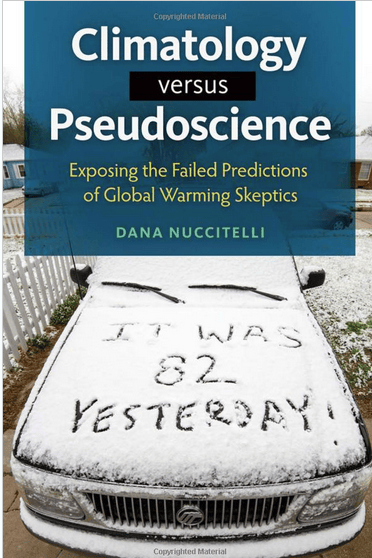 Climatology versus Pseudoscience cover
Climatology versus Pseudoscience coverI’ve just had a book published entitled Climatology versus Pseudoscience: Exposing the Failed Predictions of Global Warming Skeptics.
 Climatology versus Pseudoscience cover
Climatology versus Pseudoscience cover
The book covers a wide range of climate-related topics, starting with a history of some key discoveries in the field of climate science beginning nearly 200 years ago. Along the way it debunks some common climate myths, progressing forward in time to the 1970s, when scientists’ ability to model the global climate began to advance rapidly. It examines the accuracy of a variety of global warming projections, starting with J.S. Sawyer in 1972, through the recent IPCC reports, as well as some predictions by contrarians like Richard Lindzen.
On the flip side of the coin, climate contrarians have predicted anything from minimal warming to rapid global cooling. Their predictions have generally been terribly inaccurate, and yet the same people who have made these wrong predictions are still treated as credible experts by certain segments of the media. It seems as though their history of inaccurate predictions has no effect on their credibility. When scientists with a history of inaccurate predictions are treated with the same credibility as those who have made accurate predictions, that’s a problem.
The book discusses the 97% expert consensus on human-caused global warming and the details of our 2013 study that was the latest to arrive at that result. It also looks at the scientific evidence that underlies that expert consensus. After all, the consensus itself is just an indicator of the strength of the underlying scientific evidence. Climatology versus Pseudoscience is extensively researched, with over 100 references to peer-reviewed climate studies.
One chapter focuses specifically on some recent scientific research on continued global warming and the causes of the temporary slowdown of surface warming. This is an important topic, because the temporary so-called ‘pause’ or ‘hiatus’ has been so overblown in the media.
In fact, holding the media accountable for inaccurate and unrepresentative climate coverage was another factor that motivated me to write this book. The less than 3% of contrarian climate scientists like fossil fuel-funded Willie Soon(and worse, contrarian non-experts) have received a disproportionate media coverage. This is why people vastly underestimate the expert consensus on human-caused global warming, and it’s one of the main reasons why people don’t view climate change as an urgent issue. This problem of false balance in climate reporting has even plagued normally reliable media outlets like the BBC and The Telegraph.
Posted by dana1981 on Monday, 23 February, 2015
 |
The Skeptical Science website by Skeptical Science is licensed under a Creative Commons Attribution 3.0 Unported License. |